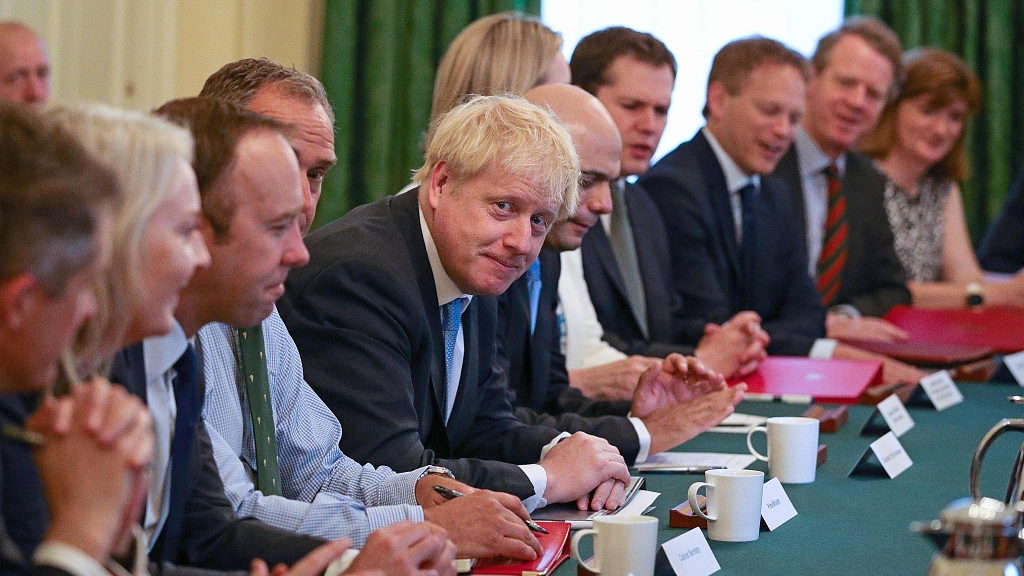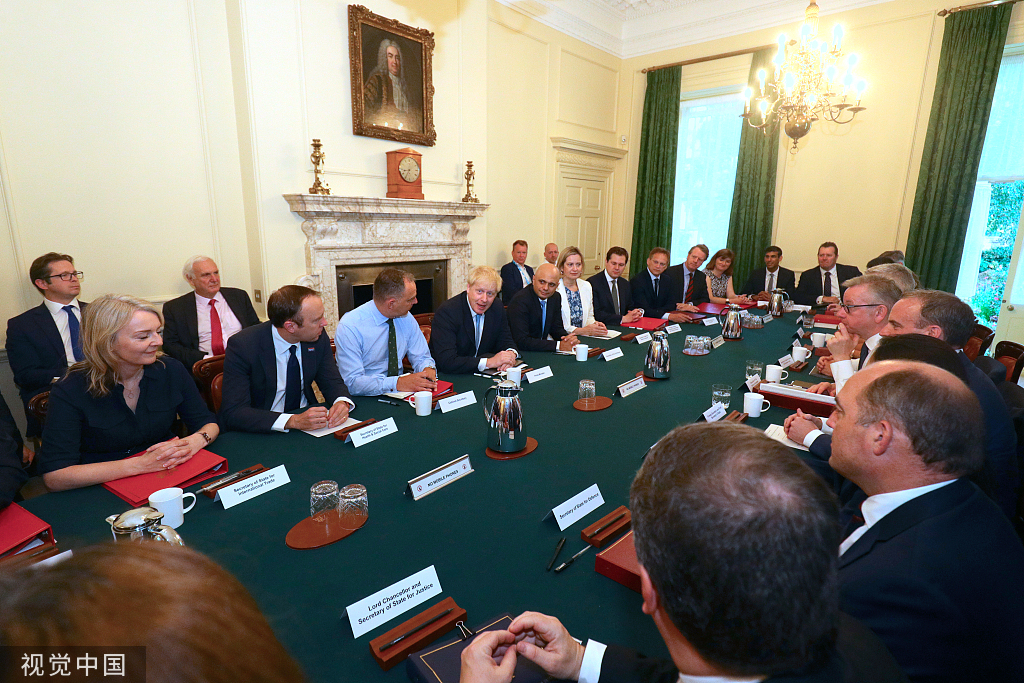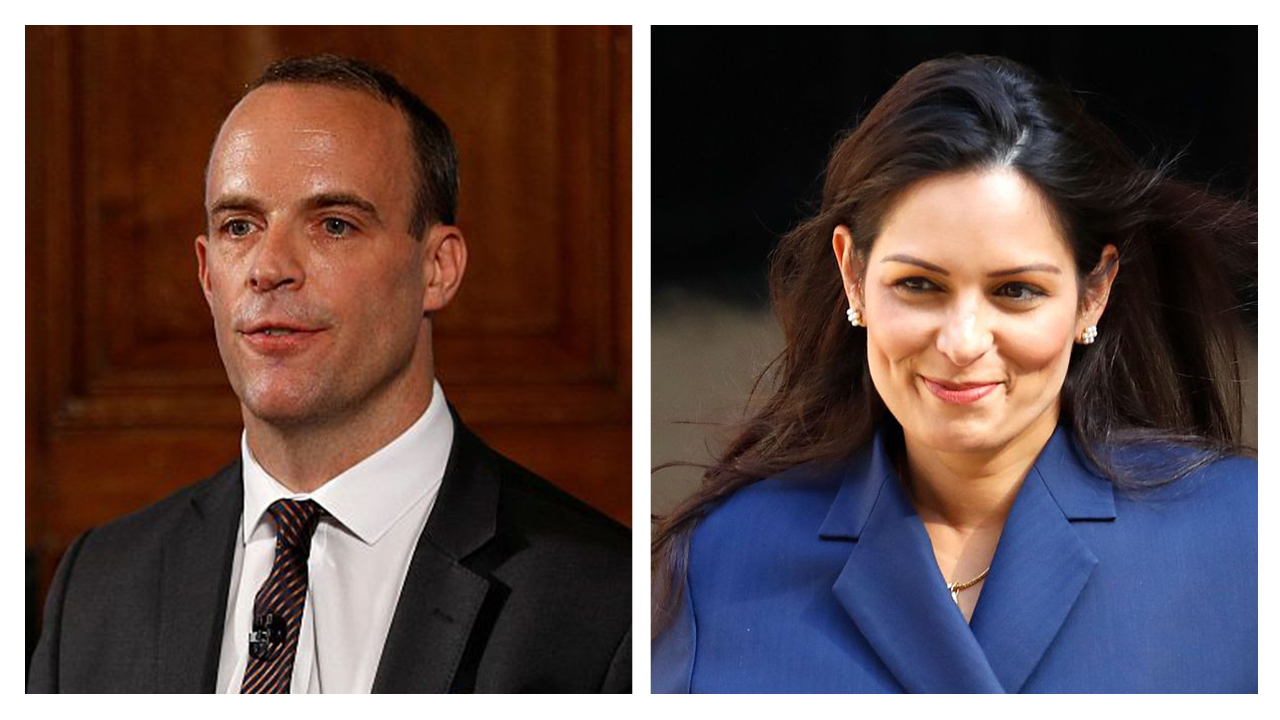

Editor's note: Chris Deacon is a postgraduate researcher in politics and international relations at the University of London and previously worked as an international commercial lawyer. The article reflects the author's opinion, and not necessarily the views of CGTN.
Following his takeover of 10 Downing Street as the UK's new prime minister on Wednesday, Boris Johnson has proceeded to appoint his new cabinet. The changes he has made to his predecessor Theresa May's ministerial team have been wide-ranging and emblematic of a potential major shift in direction. Indeed, many are calling this the UK's most right-wing cabinet ever appointed.
Out of May's 30 cabinet ministers, only 13 remained in the cabinet by the end of Johnson's reshuffle. Some took the decision on their own by resigning their posts in advance of Johnson becoming prime minister – mostly due to clashing views on Brexit policy. Many others, however, were sacked in the somewhat brutal transition.
The first, and perhaps least surprising, element to recognize about this cabinet is the high number of Brexit supporters. Johnson has insisted as a condition of being a member of the cabinet that all ministers must support the UK leaving the European Union on October 31, even if this means doing so without a deal.
As a result of this, the new cabinet is full of Brexit "true believers" – those who supported the UK's withdrawal from the EU during the referendum, rather than simply moving from a Remain-supporting position to a commitment to respect the outcome of the 2016 referendum, as many members of May's cabinet did (including May herself).
This is likely to be at least partly strategic on Johnson's part – Nigel Farage's Brexit Party has challenged the Conservatives on the basis that May and her team was not fully behind Brexit and would only implement something short of a full withdrawal. If Johnson can point to enough Brexit purists in his cabinet, however, this might help the Tories in any upcoming general election before Brexit has been implemented.

Newly elected Prime Minister Boris Johnson holds his first Cabinet meeting in 10 Downing Street, England, July 25, 2019. /VCG Photo
But it is not only the Brexit issue in which this cabinet has a clear ideological bent. The new Home Secretary Priti Patel, for example, was forced to resign from her previous position due to holding unofficial meetings with Israeli officials without any UK diplomats present in order to arrange UK aid for Israeli army operations in Syria.
It has also been noted that Patel previously endorsed capital punishment – a fairly extreme policy position in contemporary Britain. She claims to have now changed her mind on the issue, but Johnson was still forced to deny that his government would introduce the policy within 24 hours of its beginning.
The new Foreign Secretary, Dominic Raab, has also been associated with several comments which mark him as a social conservative. Raab, for example, has branded feminists as being "among the most obnoxious bigots." He went on to defend these comments when challenged on them.

Foreign Secretary Dominic Raab (L) and Home Secretary Priti Patel. /VCG Photo
But perhaps the new cabinet minister with some of the most infamous out-of-touch social views is Jacob Rees-Mogg, now Leader of the House of Commons. Rees-Mogg has in the past repeatedly cited his Catholic background as informing his views on a variety of social issues such as abortion and same-sex marriage.
He has stated, for example, that he is against abortion in all circumstances, including in cases of rape and incest. Such views, while he was a backbencher, could be defended as entirely personal and completely removed from government policy. However, Rees-Mogg is now a member of the government and must therefore abide by collective ministerial responsibility rules.
It remains to be seen whether he will have an epiphany which will alter some of these views to move them more in line with UK government policy, or whether he will be allowed to continue to endorse "personal" opinions while remaining in the cabinet.
One might conclude from these appointments that Johnson himself is a social conservative, but, on the contrary, he has a clearly socially liberal voting record. Johnson cultivated his image as a social liberal while being the Mayor of London – a richly diverse and deeply liberal city – but has largely continued in this vein since this time.
It is on Brexit, however, that Johnson reverted back to what many perceive as a right-wing position (although there are, of course, left-wing arguments for leaving the EU too). He is now, therefore, associated with some of the most socially conservative members of his party, despite the views he has espoused himself.
This will be an interesting contrast between Johnson and those he has appointed. Will he allow them to move towards their right-wing proclivities on social issues, or will he continue in his previous style, defending socially liberal causes. We’ll wait and see.
(If you want to contribute and have specific expertise, please contact us at opinions@cgtn.com.)

Copyright © 2018 CGTN. Beijing ICP prepared NO.16065310-3
Copyright © 2018 CGTN. Beijing ICP prepared NO.16065310-3